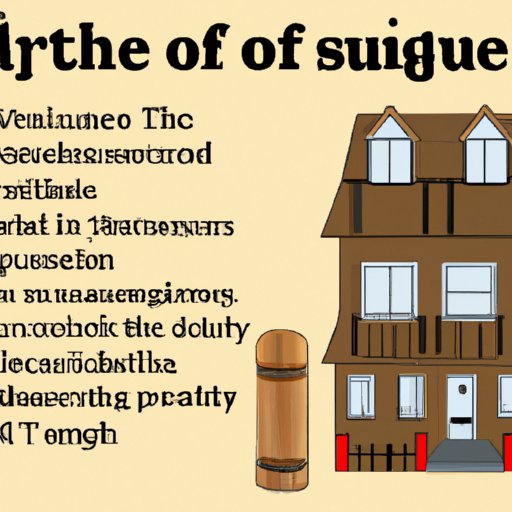Introduction
Squatters rights, or adverse possession, is a legal concept that can have serious implications for homeowners. But what exactly are squatters rights? What do the laws say about them, and how can you protect yourself if someone attempts to claim your property through adverse possession? This article will provide an overview of squatters rights in the United States, including a legal overview, an explanation of local and state laws, a look at the pros and cons, a history of squatters rights, and tips for protecting yourself from claims.
Explaining Squatters Rights: A Legal Overview
The term “squatters rights” refers to a person’s right to take possession of land or property that they do not own. Generally speaking, a squatter must occupy the land for a certain period of time (typically between five and 20 years) before they can make a valid claim. In some cases, a squatter may even be able to gain ownership of the land if the original owner fails to take legal action against them.
Under the law, a squatter must meet certain requirements in order to make a valid claim. First, they must demonstrate that their occupancy of the land was exclusive, meaning that no one else had access to the property during the time of occupancy. Second, they must show that their occupancy was open and notorious, meaning that it was obvious to anyone who might have seen it that the squatter was living on the property. Finally, they must prove that their occupancy was continuous, meaning that they did not leave the property for any extended period of time.
There are also certain exceptions to squatters rights. For example, if the original owner of the property returns after the squatter has taken possession, the squatter’s claim is no longer valid. Additionally, if the squatter is found to have entered the property illegally or with the intent to commit a crime, their claim will not be recognized by the court.

Understanding Squatting Laws in Your State
Squatting laws vary from state to state, so it’s important to understand the laws in your area. Most states require that the squatter occupy the property for at least seven years before they can make a valid claim. Some states also require that the squatter pay taxes on the property or make improvements to it in order for their claim to be considered valid. It’s also important to note that some states recognize squatters rights while others do not.
In addition to understanding the laws in your state, it’s also important to know your rights as a homeowner. If you suspect that someone is attempting to claim your property through adverse possession, you should contact a lawyer who can advise you on your options. Depending on the situation, you may be able to take legal action to remove the squatter and reclaim your property.

The Pros and Cons of Squatters Rights
Squatters rights can have both advantages and disadvantages. On the one hand, they can help ensure that unused or abandoned properties don’t remain vacant for long periods of time, which can benefit the community as a whole. On the other hand, squatters rights can be abused by people who are looking to take advantage of unsuspecting homeowners.
From a homeowner’s perspective, the potential drawbacks of squatters rights far outweigh the benefits. Homeowners could lose their property if a squatter is able to make a valid claim, and there’s often little that can be done to prevent it from happening. Furthermore, the process of evicting a squatter can be lengthy and expensive, leaving homeowners feeling helpless and frustrated.

The History of Squatters Rights in the U.S.
The concept of squatters rights has been around since the 1600s, when English common law first established the right to take possession of unused land. This right was later adopted by the United States, and has since become an integral part of American law. Over the years, there have been numerous cases involving squatters rights, ranging from small disputes over backyards to large-scale claims over entire tracts of land.
One famous example of a squatters rights case is the Supreme Court case of Johnson v. M’Intosh, which involved two men who were claiming ownership of the same parcel of land in Illinois. The court ultimately ruled in favor of the first claimant, establishing the principle of “first in time, first in right”, which still stands today.
How to Protect Yourself From Squatters Rights Claims
As a homeowner, it’s important to take steps to protect yourself from squatters rights claims. One of the easiest ways to do this is to keep your property well maintained and secure. Make sure that all gates and fences are locked, and keep an eye out for suspicious activity. Additionally, it’s a good idea to familiarize yourself with the laws in your state and consult a lawyer if you have any questions or concerns.
It’s also important to be aware of your rights as a homeowner. If you suspect that someone is attempting to claim your property through adverse possession, you should contact a lawyer immediately. They can advise you on your options and help you take the necessary steps to protect your property.
Conclusion
Squatters rights can have serious implications for homeowners, but it’s important to understand the legalities surrounding them. By familiarizing yourself with the definition of squatters rights, knowing the laws in your state, understanding the pros and cons, and taking steps to protect yourself, you can ensure that your property is safe from squatters rights claims.
(Note: Is this article not meeting your expectations? Do you have knowledge or insights to share? Unlock new opportunities and expand your reach by joining our authors team. Click Registration to join us and share your expertise with our readers.)
